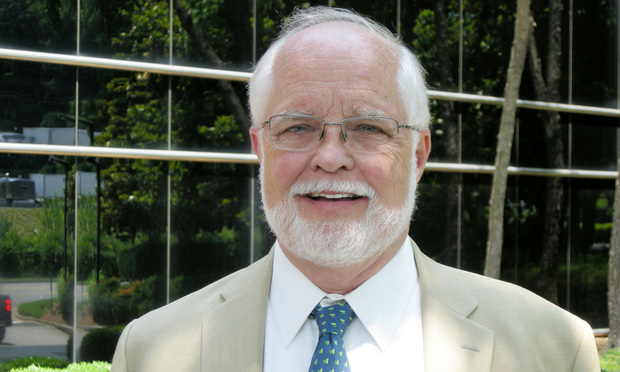Jury Awards $14M to Woman Going Blind From Surgical Prep Solution
The plaintiff has lost nearly all of her vision, a process that started after a surgical preparation leaked into her eyes during neck surgery in 2014.
May 23, 2019 at 06:31 PM
7 minute read
 James Poe, The Poe Law Firm, Atlanta. (Courtesy photo)
James Poe, The Poe Law Firm, Atlanta. (Courtesy photo)
A Gwinnett County jury awarded $14 million to a woman who is losing her eyesight due to a cleansing solution that seeped into her eyes during surgery on her neck in 2014.
Lead plaintiffs attorney James Poe said his client has gone completely blind in one eye and has only 10 percent tunnel vision in the other, which is worsening as the optic nerve deteriorates.
“Her doctor testified that she's likely to lose both eyes,” said the Poe Law Firm principal, who represented plaintiff Rosalind Johnson along with P. Charles Scholle of Duluth's Scholle Law. Johnson, 60, is a military veteran.
Poe added that the doctor “said the only way to relieve the physical pain from the pressure in her eyes is to remove both eye globes.”
Two-thirds of the $14 million verdict was apportioned to the estate of a now-deceased anesthesiologist who sedated Johnson and one-third to his physician assistant and the practice that employed her.
The defense portion of the pretrial order said the anesthesiologists had adhered to the standard of care and that any decision regarding the type of antiseptic preparation had been made by the surgeon. Another case, against the hospital, is pending.
Poe said there had been settlement discussions but that counsel for the physician assistant parties refused to tender their insurance policy limits.
“We said it has to be a joint offer of settlement, otherwise they're going to blame the doctor for inadequate supervision. So they either had to settle together or go to trial together,” Poe said.
“Even at trial, when the jury was out for deliberations and there was some limited discussion about a high-low agreement, they still refused,” he said.
“We told them, 'You're going to have a problem,' and we gave them a number that was about half of what the jury came back with.”
Anesthesia physician assistant Claire Wainwright and American Anesthesiology Associates are represented by Matthew Coles and John Autry of Lawrenceville's Coles Barton.
“We are sorely disappointed in the verdict and do anticipate there being post-trial motions and, if necessary, an appeal,” Coles said.
Nonetheless, he congratulated Poe and Scholle for their handling of the case and hailed State Court Senior Judge Joseph Iannazzone for a “truly wonderful job.”
“Judge Iannazzone has shepherded this case for many years, and everyone was glad to have him on [for the trial],” Coles said.
The estate of Dr. Thomas Francis, who died of cancer while the case was pending, is represented by Weinberg Wheeler Hudgins, Gunn & Dial partner John Train IV, who agreed with Coles' regarding posttrial motions.
Train said the plaintiff and her husband “are two of the nicest and most sympathetic plaintiffs I've met in my 28 years of practicing law, and they had an excellent attorney who tried an exceptional case.”
According to Poe and court filings by the plaintiff, in November 2014, Johnson was referred to Gwinnett Medical Center by the Veterans Administration to undergo a cervical spine fusion surgery.
Prior to beginning the five-hour surgery, during which she would be sedated and lying face-down, Johnson's eyes were taped shut.
“The anesthesiologist has to seal the eyes shut because the patient can't feel anything when they're unconscious, so they don't know if something's running into their eyes and burning them,” Poe said.
“After the surgery, they wake her up and they see these gray-green lines running across her eyes,” he said. “It turns out she can barely see at all. Everything's very blurry, and her eyes are burning.”
An ophthalmologist said there were no foreign materials in her eyes, he said, and it was ultimately determined that the incision site on her neck had been cleaned in a solution known as ChloraPrep, which is caustic to the eye, Poe said.
Johnson was treated by a VA ophthalmologist for four years as her eyesight deteriorated, undergoing two failed corneal transplants in an effort to save her sight.
Her husband, a truck driver, quit his job to stay home and care for her full-time, he said.
In 2016 Johnson sued Francis, Wainwright's supervising physician; Wainwright and her employer; and Gwinnett Medical Center in Gwinnett County State Court. The hospital was later dismissed from that suit but is still a defendant in separate, related litigation.
During the weeklong trial, Poe said key plaintiff's arguments centered on the responsibility of Francis, the supervising anesthesiologist and his assistant to ensure that the patient's safety was safeguarded, particularly in the crucial few minutes when Johnson's skin was being prepped for surgery.
“Our expert said the anesthesiologist had the responsibility to protect the eyes, which were only inches away from the sterilization site,” he said. “That's why you have a supervising anesthesiologist.”
Wainwright, he said, had been out of school for only a year or two and had participated in similar procedures in which a nontoxic antiseptic had been used, “so she assumed it would be harmless. That was a fatal mistake.”
The defense's theory, said Poe, “was that the taping had been observed by the doctors and a nurse anesthetist who relieved [Wainwright] during the procedure: 'What more could she have done?'” Poe said.
“Our response was that she didn't watch adequately.”
Poe said key plaintiffs experts included the VA ophthalmologist, David Paine, who is also on the staff of the Emory University Eye Center; Minneapolis ophthalmologist Elizabeth Davis; and anesthesiology experts William Mazzei from the University of California at San Diego and Kathryn McGoldrick of New York Medical College.
Defense experts included anesthesiology assistant specialist John Lipian from Tallahassee and anesthesiologist Jack Paschal of St. Mary's Health System in Athens.
Poe and Coles said the defendants presented a united defense and did not attempt to shift blame to each other.
At closing, Poe said he asked the jury to award $25 million to $30 million in damages.
Opposing counsel “asked for a straight defense verdict; they did not talk about damages at all,” he said.
The jury began deliberations Friday before returning Monday for a few more hours, taking a total of about 5 hours to award $14 million.
Poe said he did not speak to the jurors afterward.
This content has been archived. It is available through our partners, LexisNexis® and Bloomberg Law.
To view this content, please continue to their sites.
Not a Lexis Subscriber?
Subscribe Now
Not a Bloomberg Law Subscriber?
Subscribe Now
NOT FOR REPRINT
© 2025 ALM Global, LLC, All Rights Reserved. Request academic re-use from www.copyright.com. All other uses, submit a request to [email protected]. For more information visit Asset & Logo Licensing.
You Might Like
View All

Upcoming Changes to Medicare Secondary Payer Reporting: What WC Insurers and Attorneys Need to Know
5 minute read
Biden Administration Tells Justices That Bans on Gender Care Are Sex Discrimination

11th Circuit Allows Florida Transgender Health Care Ban to Continue Pending Full Appeal on Constitutionality of Law
Trending Stories
- 1Pro Hac Vice in Georgia: Rule Change for Nonresident Attorneys
- 2The Benefits of E-Filing for Affordable, Effortless and Equal Access to Justice
- 3AI and Social Media Fakes: Are You Protecting Your Brand?
- 4A Primer on Using Third-Party Depositions To Prove Your Case at Trial
- 5‘Catholic Charities v. Wisconsin Labor and Industry Review Commission’: Another Consequence of 'Hobby Lobby'?
Who Got The Work
J. Brugh Lower of Gibbons has entered an appearance for industrial equipment supplier Devco Corporation in a pending trademark infringement lawsuit. The suit, accusing the defendant of selling knock-off Graco products, was filed Dec. 18 in New Jersey District Court by Rivkin Radler on behalf of Graco Inc. and Graco Minnesota. The case, assigned to U.S. District Judge Zahid N. Quraishi, is 3:24-cv-11294, Graco Inc. et al v. Devco Corporation.
Who Got The Work
Rebecca Maller-Stein and Kent A. Yalowitz of Arnold & Porter Kaye Scholer have entered their appearances for Hanaco Venture Capital and its executives, Lior Prosor and David Frankel, in a pending securities lawsuit. The action, filed on Dec. 24 in New York Southern District Court by Zell, Aron & Co. on behalf of Goldeneye Advisors, accuses the defendants of negligently and fraudulently managing the plaintiff's $1 million investment. The case, assigned to U.S. District Judge Vernon S. Broderick, is 1:24-cv-09918, Goldeneye Advisors, LLC v. Hanaco Venture Capital, Ltd. et al.
Who Got The Work
Attorneys from A&O Shearman has stepped in as defense counsel for Toronto-Dominion Bank and other defendants in a pending securities class action. The suit, filed Dec. 11 in New York Southern District Court by Bleichmar Fonti & Auld, accuses the defendants of concealing the bank's 'pervasive' deficiencies in regards to its compliance with the Bank Secrecy Act and the quality of its anti-money laundering controls. The case, assigned to U.S. District Judge Arun Subramanian, is 1:24-cv-09445, Gonzalez v. The Toronto-Dominion Bank et al.
Who Got The Work
Crown Castle International, a Pennsylvania company providing shared communications infrastructure, has turned to Luke D. Wolf of Gordon Rees Scully Mansukhani to fend off a pending breach-of-contract lawsuit. The court action, filed Nov. 25 in Michigan Eastern District Court by Hooper Hathaway PC on behalf of The Town Residences LLC, accuses Crown Castle of failing to transfer approximately $30,000 in utility payments from T-Mobile in breach of a roof-top lease and assignment agreement. The case, assigned to U.S. District Judge Susan K. Declercq, is 2:24-cv-13131, The Town Residences LLC v. T-Mobile US, Inc. et al.
Who Got The Work
Wilfred P. Coronato and Daniel M. Schwartz of McCarter & English have stepped in as defense counsel to Electrolux Home Products Inc. in a pending product liability lawsuit. The court action, filed Nov. 26 in New York Eastern District Court by Poulos Lopiccolo PC and Nagel Rice LLP on behalf of David Stern, alleges that the defendant's refrigerators’ drawers and shelving repeatedly break and fall apart within months after purchase. The case, assigned to U.S. District Judge Joan M. Azrack, is 2:24-cv-08204, Stern v. Electrolux Home Products, Inc.
Featured Firms
Law Offices of Gary Martin Hays & Associates, P.C.
(470) 294-1674
Law Offices of Mark E. Salomone
(857) 444-6468
Smith & Hassler
(713) 739-1250






